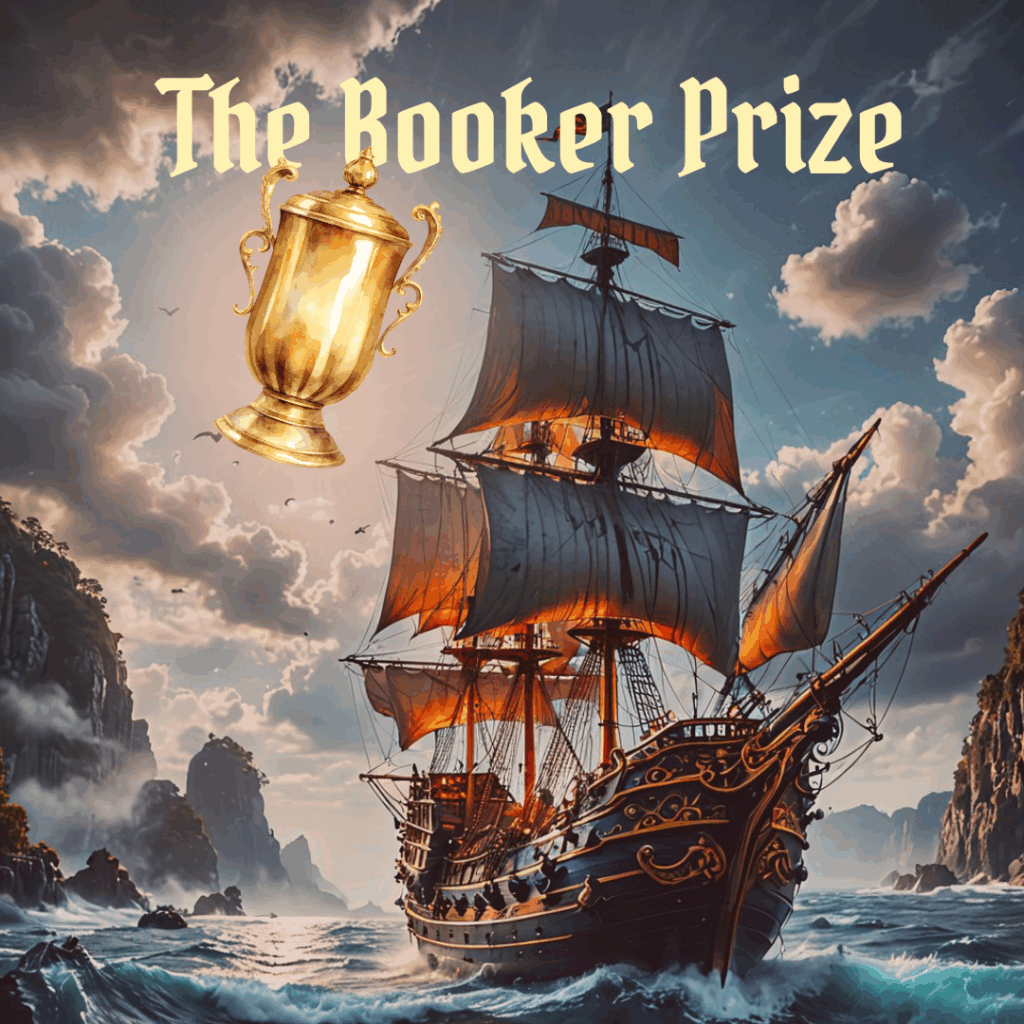Ahoy, Fellow Literary Adventurers!
In the vast sea of literary awards, few treasures shine as brightly as the Booker Prize. Like the legendary pirates who once sailed the waters around 1820s Hawai’i—those rogues I write about with such fondness—the Booker Prize has been capturing literary gold for over five decades.
But unlike my seafaring characters who sought doubloons and pieces of eight, this prestigious award hunts for something far more valuable: exceptional storytelling that transforms both writers and readers alike.
Could there be some good to it when a literary prize becomes as influential as the trade winds that once carried ships across the Pacific? Absolutely. The Booker Prize doesn’t just recognize outstanding fiction; it creates literary legends and introduces readers to voices they might never have discovered otherwise.

Table of Contents:
- The Origins of Literary Treasure: How the Booker Prize Set Sail
- Recent Literary Conquests: The Modern Booker Prize Winners
- The Booker Prize's Cultural Impact: More Than Just Literary Recognition
- Memorable Moments and Maritime-Worthy Drama
- International Recognition: Celebrating Translated Fiction
- Why the Booker Prize Matters to Historical Fiction Readers
- Looking Forward: The Future of Literary Excellence
- Conclusion: Charting Your Own Literary Course
The Origins of Literary Treasure: How the Booker Prize Set Sail
A Prize Born from Commerce and Culture
Lo-and-behold, the Booker Prize emerged in 1969 from rather practical beginnings. Booker McConnell, a multinational company with historical ties to sugar plantations (and yes, some uncomfortable connections to slavery), established this award as Britain’s answer to France’s Prix Goncourt. The irony wasn’t lost on everyone—in 1972, John Berger famously used his acceptance speech to donate half his prize money to the British Black Panthers, protesting the very company that sponsored the award.
Much like the complex moral landscape my characters navigate in the post-privateering world of New Orleans, the Booker Prize has always existed within these fascinating contradictions of commerce and art, power and protest.
Evolution Through the Decades
The prize has undergone more transformations than a pirate changing flags to avoid capture:
– 1969-2001: The original Booker Prize era
– 2002-2019: The Man Booker Prize years (when Man Group PLC took the helm)
– 2019-present: Back to simply “Booker Prize” under Crankstart sponsorship
Meanwhile, the International Booker Prize (formerly Man Booker International Prize) emerged in 2005, initially celebrating lifetime achievements before evolving into an annual award for translated fiction in 2016.
Recent Literary Conquests: The Modern Booker Prize Winners
2025: A Historic Victory for Translated Literature
This year brought us something as remarkable as discovering a new trade route: Banu Mushtaq’s Heart Lamp became the first short story collection to win the International Booker Prize. Translated by Deepa Bhasthi from Kannada—a language spoken by 65 million people but rarely seen in English translation—this collection chronicles the lives of women in southern India’s Muslim communities.
The judges called it “a radical translation which ruffles language, to create new textures in a plurality of Englishes.” Rather like how the pidgin languages of 1820s port cities created new ways of communication, wouldn’t you say?
Recent Booker Prize Champions
2024: Samantha Harvey – Orbital
Harvey’s space-set novel proved that the Booker Prize could reach beyond earthly concerns. At just 136 pages, it became the second-shortest winner in prize history—proving that sometimes the most powerful stories come in compact packages, much like the concentrated drama aboard a ship during a long voyage.
2023: Paul Lynch – Prophet Song
This dystopian vision of Ireland under totalitarian rule reminded us that the best historical fiction often illuminates present dangers. Lynch’s work resonates with anyone who understands how quickly political winds can shift—a lesson my own characters learned navigating the changing allegiances of the 1820s.
2022: Shehan Karunatilaka – The Seven Moons of Maali Almeida
A mystery thriller set during Sri Lanka’s civil war, this novel combined humor with horror in ways that would make even the most seasoned privateer appreciate the complexity of human nature.
The Booker Prize’s Cultural Impact: More Than Just Literary Recognition
The Legendary “Booker Bounce”
Winning the Booker Prize creates what insiders call the “Booker bounce”—a phenomenon more reliable than trade winds. Consider these remarkable transformations:
– Anna Burns’ Milkman saw sales increase by 880% in the week following her 2018 win
– Douglas Stuart’s Shuggie Bain sold over 25,000 copies in its first week post-victory—a 1,900% increase
– Damon Galgut sold more copies in 12 weeks after winning than in his previous 17 years of UK publication
These numbers would make even the most successful merchant captain envious!
Breaking Barriers and Setting Records
The Booker Prize has consistently pushed boundaries, much like the bold women who defied convention in my historical novels:
– Bernardine Evaristo became the first Black woman to win in 2019
– Eleanor Catton remains the youngest winner at 28 (2013)
– Margaret Atwood and Hilary Mantel are among the few to win twice
– Salman Rushdie holds the record for most nominations (seven times)
Memorable Moments and Maritime-Worthy Drama
Literary Controversies Worth Remembering
The Booker Prize has generated more drama than a tavern brawl in the Vieux Carré:
1977: Chair of judges Philip Larkin threatened to jump out a window if Paul Scott’s *Staying On* didn’t win. (Fortunately, it did, and Larkin remained safely indoors.)
1983: Fay Weldon delivered a devastating attack on the publishing industry during her acceptance speech—the literary equivalent of a broadside against merchant vessels.
2019: The rules stated only one winner, but judges couldn’t choose between Margaret Atwood and Bernardine Evaristo, so they declared a tie anyway. Sometimes even literary judges practice a bit of piracy!
The Comedy Question
For years, critics claimed the Booker Prize avoided comic novels like ships avoiding rocky shores. This notion was thoroughly debunked—after all, winners like Kingsley Amis’s The Old Devils and J.G. Farrell’s The Siege of Krishnapur rank among the funniest novels in English literature. As Howard Jacobson (2010 winner) noted, the idea that his The Finkler Question was the first comic novel to win was “nonsense.”
International Recognition: Celebrating Translated Fiction
The International Booker Prize’s Growing Influence
Since 2016, the International Booker Prize has become a beacon for translated literature, splitting its £50,000 prize equally between author and translator. Having been a translator myself, this development particularly warms my heart. Recent winners showcase the global nature of contemporary storytelling:
– 2024: Jenny Erpenbeck’s Kairos (German, translated by Michael Hofmann)
– 2023: Georgi Gospodinov’s Time Shelter (Bulgarian, translated by Angela Rodel)
– 2022: Geetanjali Shree’s Tomb of Sand (Hindi, translated by Daisy Rockwell)
A Personal Connection to Global Voices
As someone who writes about the multicultural world of 1820s Hawai’i and New Orleans—where French, Spanish, English, Hawaiian, and countless other languages created a rich linguistic tapestry—I find particular joy in how the International Booker Prize celebrates this diversity. These translated works remind us that the best stories transcend linguistic boundaries, much like how the universal themes of adventure, love, and freedom spoke to sailors regardless of their native tongue.
Why the Booker Prize Matters to Historical Fiction Readers
Connecting Past and Present
The Booker Prize consistently recognizes works that illuminate how historical forces shape individual lives—a theme central to my own writing. Whether it’s Hilary Mantel’s Tudor England or my own explorations of post-Napoleonic maritime culture, the best historical fiction helps us understand that the past isn’t a foreign country but rather the foundation upon which our present stands.
Discovering New Voices and Perspectives
Just as my characters encounter unexpected allies and adversaries in their journeys, Booker Prize winners introduce readers to perspectives they might never have considered. The prize’s increasing recognition of diverse voices—from different cultures, languages, and backgrounds—mirrors the cosmopolitan world of historical ports where my stories unfold.
Looking Forward: The Future of Literary Excellence
2025 Judges and Beyond
The 2025 Booker Prize panel includes an intriguing mix: Roddy Doyle (1993 winner) chairs the panel alongside Sarah Jessica Parker—yes, Carrie Bradshaw herself has traded cosmos for literary criticism! This unexpected appointment proves that passion for reading matters more than academic credentials, a refreshingly democratic approach to literary judgment.
Continuing Traditions
As we sail into the future, the Booker Prize remains committed to discovering and celebrating exceptional storytelling. For those of us who write historical fiction, it serves as both inspiration and aspiration—a reminder that the best stories, whether set in Tudor England or 1820s Hawai’i, speak to universal human experiences.
Conclusion: Charting Your Own Literary Course
The Booker Prize represents more than literary recognition; it’s a compass pointing toward exceptional storytelling that enriches our understanding of the human experience. From Banu Mushtaq’s groundbreaking *Heart Lamp* to the space-bound reflections of Samantha Harvey’s *Orbital*, these award-winning works remind us why we fell in love with reading in the first place.
As you explore these literary treasures, I invite you to consider how they might illuminate your own reading journey. Perhaps you’ll discover a new favorite author, or maybe you’ll find inspiration for your own creative endeavors. After all, the best adventures—whether on the high seas or between the pages of a book—begin with a willingness to explore uncharted waters.
Would you dare to venture beyond your usual reading harbors and explore these Booker Prize winners? Their stories await those brave enough to set sail into new literary territories.
FAQ
What is the Booker Prize and why is it important?
The Booker Prize is the leading literary award for English-language fiction, recognizing exceptional novels published in the UK and Ireland. It’s important because it significantly boosts authors’ careers and introduces readers to outstanding contemporary literature.
How much money do Booker Prize winners receive?
Winners receive £50,000, while each of the six shortlisted authors receives £2,500. The International Booker Prize splits its £50,000 equally between author and translator.
What is the “Booker bounce” effect?
The “Booker bounce” refers to the dramatic increase in book sales following a Booker Prize win, often seeing increases of 800-2000% in the weeks after the announcement.
Can American authors win the Booker Prize?
Yes, since 2014, the Booker Prize has been open to authors of any nationality, as long as their work is published in the UK or Ireland.
What’s the difference between the Booker Prize and International Booker Prize?
The Booker Prize recognizes English-language fiction, while the International Booker Prize celebrates fiction translated into English, honoring both author and translator.
Who was the youngest Booker Prize winner?
Eleanor Catton won at age 28 in 2013 for *The Luminaries*, making her the youngest winner in the prize’s history.
Sources:
https://thebookerprizes.com/the-booker-library/features/booker-prize-facts-and-figures
https://thebookerprizes.com/booker-prize/about-the-booker-prize
https://www.theguardian.com/books/booksblog/2010/oct/14/booker-prize-disdains-comedy-joke
https://www.britannica.com/art/Booker-Prize
https://www.boersenblatt.net/news/buchhandel-news/booker-prize-fuer-samantha-harvey-352698
Pixabay.com: iPicture, Jessica_Designer
This is going to be incredibly useful for my work.
Thank you Blogi Nauki, I appreciate it! 🙂
Reading this piece felt like walking through a beautiful garden of ideas — each thought more inviting than the last.
Thanks TyT! I appreciate it! 🙂
Very insightful read—definitely bookmarking this site for future reference.


Leave a Reply